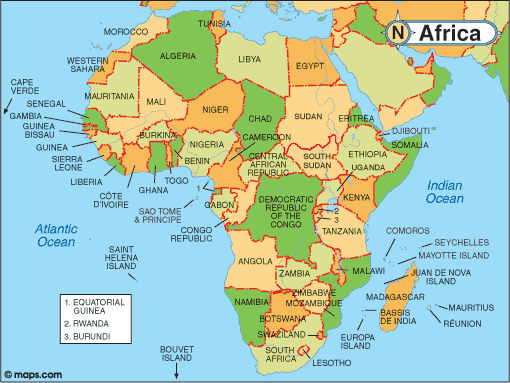
Class Reminders: Make sure you are studying your vocabulary words for the quiz on Friday.
In class: background information on Yoruba culture in preparation for reading the Nigerian play Death and the King's Horseman. Creating associative masks with four accompanying sentences. (graded class participation assignment)
In class: background information on Yoruba culture in preparation for reading the Nigerian play Death and the King's Horseman. Creating associative masks with four accompanying sentences. (graded class participation assignment)
Learning Targets/objectives:
I can make connections between the text and different cultural perspectives. (11-12R9)
I can use the visuals and art to deepen my understanding of the Yoruba culture. (11-12SL5)
I can use my personal experience as a way to enhance my learning of the text. (11-12R9)
The colonization of Africa
led to a conflict of traditional African cultures with European control. Wole
Soyinka, the playwright behind Death And the King's Horseman examines that
clash of culture and control through the use of his writing. This play is based
on a similar incident that occurred between the Yoruba culture and Great Britain
during the height of colonization.
This play is set in what we
now call Nigeria. This was the center for the Yoruba culture. Africa was
colonized by various countries. Nigeria was one of the parts of Africa that was
colonized and controlled by Great Britain.
The country became independent on October 1, 1960, and in 1963 adopted a republican constitution but elected to stay a member of the Commonwealth. (a free association of sovereign states comprising the United Kingdom and a number of its former dependencies who have chosen to maintain ties of friendship and practical cooperation and who acknowledge the British monarch as symbolic head of their association.)
Most Yoruba men are farmers, growing yams, corn (maize), and millet as staples and plantains, peanuts (groundnuts), beans, and peas as subsidiary crops; cocoa is a major cash crop. Others are traders or craftsmen. Women do little farm work but control much of the complex market system—their status depends more on their own position in the marketplace than on their husbands’ status.
The Yoruba have traditionally been among the most skilled and productive craftsmen of Africa. They worked at such trades as blacksmithing, weaving, leather working, glassmaking, and ivory and wood carving. In the 13th and 14th centuries Yoruba bronze casting using the lost-wax (cire perdue) method reached a peak of technical excellence never subsequently equaled in western Africa. Yoruba women engage in cotton spinning, basketry, and dyeing.(Britannica.com)
The Yoruba have traditionally been among the most skilled and productive craftsmen of Africa. They worked at such trades as blacksmithing, weaving, leather working, glassmaking, and ivory and wood carving. In the 13th and 14th centuries Yoruba bronze casting using the lost-wax (cire perdue) method reached a peak of technical excellence never subsequently equaled in western Africa. Yoruba women engage in cotton spinning, basketry, and dyeing.
Death and The King's Horseman is a play written by Wole Soyinka and it details the interaction between the Yoruba tribe and English colonizers. It is an intimate look at tradition and it follows a ritual involving the King's Horseman and what happens to him once the king has passed. We will be looking at the role of tradition and what exactly that might entail.
Ancestral Masks: This is a deep part of the history and culture in Africa. There were many different forms of masks, each representing something. Dancers and leaders would wear masks for different rituals and ceremonies. This was an intricate part of African culture. The masks were carefully made and showed the artistic spirit of where it was made. Masks are an important symbol in the play because it helps to represent how cultures can misunderstand each other.
Assignment: We will be creating our own masks based on what makes us who we are. Just like African Masks were an expression of culture and a sense of identity, yours will be a reflection of your identity. Think about what makes you you!
-First think and brainstorm the types of things that you can incorporate into your mask. Think about your favorite hobbies, memories, items etc.
-You will be given a blank sheet of paper and crayons for you to use as you draw your mask
-After you finish your mask, write four complete sentences, explaining what you incorporated into your mask and what makes that mask an extension of you.
Assignment: We will be creating our own masks based on what makes us who we are. Just like African Masks were an expression of culture and a sense of identity, yours will be a reflection of your identity. Think about what makes you you!
-First think and brainstorm the types of things that you can incorporate into your mask. Think about your favorite hobbies, memories, items etc.
-You will be given a blank sheet of paper and crayons for you to use as you draw your mask
-After you finish your mask, write four complete sentences, explaining what you incorporated into your mask and what makes that mask an extension of you.
Death and the King’s Horseman Vocabulary
Quiz on March 29th
1. raconteur: A person skilled in telling anecdotes
2. retinue: The group following and attending to some important person
3. divination: The art or gift of prophecy by supernatural means
4. veneration: A feeling of profound respect for someone or something
5. dirge: a song or hymn of mourning as a memorial to a dead person
6. alari: a rich, woven cloth, brightly colored (Yoruba word)
7. egungun: ancestral masquerade (Yoruba word)
8. etutu: placatory rites or medicine (Yoruba word)
9. tryst: a private romantic rendezvous between lovers
10. forebears: an ancestor
11. suppliant: making a humble plea to someone in power or authority
12. acolyte: person assisting the celebrant in a religious service or procession
13. hearth: the floor/front area of a fireplace








No comments:
Post a Comment